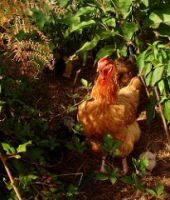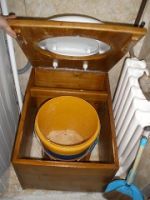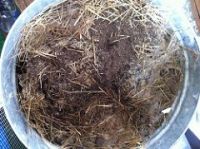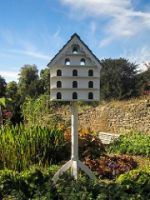How To Add Phosphorus in a Permaculture Garden

Worldwide we are facing a massive crisis as phosphorus deposits have long been misused and, like the fossil fuels we currently depend on for our food, they will run out. Scientists predict we will hit 'peak phosphorus' in around 2030. This is why we must take care of the land we have control over, conserving phosphorus and using all the resources at our disposal in an eco-friendly and sustainable way. Phosphorus is a finite resource, which is why, in our gardens and in wider systems, we should recycle it wherever we can and try to prevent its loss from our immediate environment.
 To maintain or add to existing phosphorus levels, we should close the cycle. This involves the use of animal manures, perhaps even 'humanure'. Phosphorus enters the soil ecosystem. It is used by the plants. Plants grow and animals (including humans) eat them. All too often, that phosphorus, which passed from the soil to the plants to the animals, is lost as waste – seen as a problem to be dealt with elsewhere rather than a valuable resource and a link in the chain. The ultimate recycling of waste can ensure that phosphorus is not lost to the garden system and this is certainly something to consider.
To maintain or add to existing phosphorus levels, we should close the cycle. This involves the use of animal manures, perhaps even 'humanure'. Phosphorus enters the soil ecosystem. It is used by the plants. Plants grow and animals (including humans) eat them. All too often, that phosphorus, which passed from the soil to the plants to the animals, is lost as waste – seen as a problem to be dealt with elsewhere rather than a valuable resource and a link in the chain. The ultimate recycling of waste can ensure that phosphorus is not lost to the garden system and this is certainly something to consider.
Dynamic accumulators with deep roots can help draw phosphorus to the surface soil, where it is needed by your plants and crops. (Unlike potassium, phosphorus does not move much through the soil.) Chopping and dropping, mulches and feeds return the phosphorus and other nutrients to the top soil.
Applying superphosphate and other chemical, synthetic fertilisers is a bad idea. This can damage the local environment and, since plants can only take up a small proportion of available phosphate, the soil will become unbalanced over time. In gardens, there will rarely be a need to add additional phosphorus – where there is a need to add rather than just to cycle/maintain, rock phosphate is commonly used. However, that may not be available to you locally and the more locally you can gather the materials for use in your garden, the better.

 Fish, blood and bone from your kitchen waste, if you eat meat, can be decomposed in a bokashi bucket or hot composting system for use in the garden. Adding the right kind of mycorrhizae – 'Glomus Intraradices' – will also help make phosphorus in your garden more available to your plants.
Fish, blood and bone from your kitchen waste, if you eat meat, can be decomposed in a bokashi bucket or hot composting system for use in the garden. Adding the right kind of mycorrhizae – 'Glomus Intraradices' – will also help make phosphorus in your garden more available to your plants.
In some areas, the ultimate solution (other than recycling manure from nearby livestock and perhaps human inhabitants too) is to rear chickens, rabbits, or better yet, pigeons or doves. Pigeon or dove guano is a good and prolific source of fertiliser and will help add phosphorus to your growing areas.